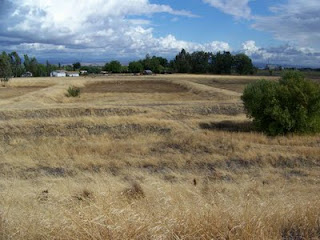
By the time I got to Wordstock, Portland's very own literary festival, it was Sunday. I'd carefully underlined all workshops and author presentations about memoir, because, let's face it, I'd still like to market my book in this economy. Seeing and hearing, and hopefully talking to some writers who had scored book deals would be inspirational, fun, beneficial. Most of what I thought might be useful was slated for Saturday. In the final analysis, I was not willing to give up the opportunity to watch some of the Breeder's Cup prep races, and, of course, Zenyatta win her 13th consecutive race.
So here I was on Sunday, touring the booths, the book sellers, the opportunities from self-publishing, to all manner of MFA programs. At noon, I noticed a pairing of authors that had both recently published memoirs. Giulia Melucci and Andy Raskin are both Brooklyn born writers, but that's where the comparison ends. Both have books out about their love lives. Raskin's is a clever book called
The Ramen King and I: How the Inventor of Instant Noodles Fixed My Love Life. Aside from learning much more than I could have ever imagined about he history of Top Ramen and its wealthy, recently departed inventor, I have no clue how the sodium laced, just add water favorite saved anything. Raskin announced that his present girlfriend was in attendance, so he wouldn't be reading any letters from his ex-girlfriends found in the book. Apparently he had a problem with fidelity in his many previous relationships (he appears to be in his late 30s) and the business philosophy of the Ramen king was better than any therapy available at the time. We'll never know. Maybe it was a clever guise to make us buy the book.
The other writer, Ms. Melucci, was all too eager to give us every detail, as described in her book,
I Loved, I Lost, I Made Spaghetti. She's an attractive, slightly zoftig 42 year old (I looked it up) who details, with recipes included, how she cooked for and lost all the marriage potential she ever found, fed, f'ked and frightened away. In the middle of her reading, she announced that the mother of one of her ex-boyfriends was present. She was pleased and from the reciprocal reaction of the older woman sitting in the front row, they still were great friends. "He's let me down too often," she said, "but he's read my book and OK with it."
In the selection she read to the 50 or so in attendance, there is a scene recounting her first meeting with "Mitch." Much like a blind date, they agree on a coffeehouse and meet for the first time. Giulia describes how they are in line, ordering a beverage, when he takes out some money. She counters with a $10 bill, saying "here's some money." He takes it.
During the Q and A session that followed, a young woman took the mic and offered a comment: "You should have known right then, when he took your money, what kind of person he was and that this relationship would never work." Applause. Probably right. Certainly had I been in that position, I'd have paid for the drinks. But I kept wondering about the entire area of dating etiquette in this post-feminist era. I remember a time when men were getting a strong message that women were independent, that they often preferred to pay their share on a date, especially if it's a first date. These equity issues also spilled over to opening up car doors, and other suddenly "sexist" forms of male behavior.
Many men my age get this. We understand that having someone pay for you all the time is not always preferable. I clearly recall wondering, when I opened a car door for a date, whether or not this would be judged as a good or bad thing. Feeling the cognitive dissonance of this issue, I remained after the presentation was over and managed to get my question heard by Ms. Melucci. "Giulia," I asked, when did the feminist movement decide that it was OK for men to pay all the time.?" I also added that I get what she's saying, and that my concern was not about the money, I simply wanted to know what the latest thinking was on this issue. I figured that since she worked for a number of publishers, had a book deal for her first book, and was a graduate of Sarah Lawrence College, she'd be the perfect person to inform me.
"It's post-feminism," she said, and then shot me a look that dismissed my question as anything but serious.
I think I know why marriage is eluding this writer.
Post WordstockI went home and looked up the term "post-feminist dating." Apparently I am not alone. And not just men what to know what's going on. A number of women acknowledge 3rd wave feminism, but still are concerned with a generation who are all too willing to sacrifice the consciousness that was raised and overcome a few decades ago.




































